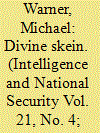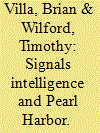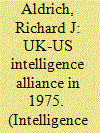|
|
|
Sort Order |
|
|
|
Items / Page
|
|
|
|
|
|
|
| Srl | Item |
| 1 |
ID:
073650


|
|
|
|
|
| Publication |
2006.
|
| Summary/Abstract |
Scholars of ancient China and students of military strategy have devoted considerable attention to Sun Tzu's The Art of War. Intelligence experts, in contrast, occasionally cite his chapter on 'The Use of Spies' but do not seem to engage his text. Part of the problem is the difficulty of translating his oracular adages; Western experts in Chinese history rarely understand the arcana of espionage, while intelligence scholars usually know no Chinese. Sun Tzu amply repays an effort to study his text, however, as he presents one of the oldest extant descriptions of an intelligence system - one that is, moreover, still insightful in our modern age.
|
|
|
|
|
|
|
|
|
|
|
|
|
|
|
|
| 2 |
ID:
073654


|
|
|
|
|
| Publication |
2006.
|
| Summary/Abstract |
The relationship between Western intelligence officials and Nazi war crimes prosecutors has been, and in some aspects remains, a difficult one. It is increasingly apparent that it is precisely the selective nature of support war crimes prosecutors can expect from intelligence officials that merits particular scholarly attention. One such example in this case of positive assistance concerns the provision of a specific piece of evidence, the diaries of Ciano, Mussolini's Foreign Minister, obtained for the Allies by Allen Dulles, a senior US wartime intelligence official with the OSS, based in Bern, Switzerland, and used in the prosecution case against Ribbentrop at the Nuremberg war crimes trials. This article, based largely upon recently declassified American security files, closely examines Dulles' actions undertaken to retrieve the diaries and pass them to the prosecution.
|
|
|
|
|
|
|
|
|
|
|
|
|
|
|
|
| 3 |
ID:
073651


|
|
|
|
|
| Publication |
2006.
|
| Summary/Abstract |
This article seeks to explore the means whereby the Spanish Monarchy under the last Habsburg, Charles II (1665-1700), contributed to its own survival in the era of Louis XIV by exploring its acquisition and use of intelligence. There was nothing particularly distinctive about Spain's intelligence machinery. Nor was it always effective. Nevertheless, Spain's extensive diplomatic and imperial network facilitated the acquisition of a great deal of information which on occasion was clearly of great importance - for example, in preventing the destruction of Charles II's fleet in the summer of 1693 by that of Louis XIV. In sum, intelligence contributed to the remarkable resilience of the Spanish Monarchy in an age of supposed Spanish decline.
|
|
|
|
|
|
|
|
|
|
|
|
|
|
|
|
| 4 |
ID:
073655


|
|
|
|
|
| Publication |
2006.
|
| Summary/Abstract |
This article traces the growth of the intelligence support role that a number of relatively small bodies have assumed within the European Union's Common Foreign and Security Policy. The implications of the development of this role are considered in detail. The article concludes that a new type of intelligence capability is gradually emerging at the European level, which could not easily be reproduced at the national or bilateral levels.
|
|
|
|
|
|
|
|
|
|
|
|
|
|
|
|
| 5 |
ID:
073652


|
|
|
|
|
| Publication |
2006.
|
| Summary/Abstract |
In recent times, Pearl Harbor historiography has shifted towards the question of whether or not the Pearl Harbor attack could have been predicted through intercepted signals. The recent prodigious output of books and articles on this subject makes it necessary to reflect upon how the debate has developed. Some traditionalists (who believe that the Pearl Harbor attack surprised US and Allied authorities) continue to criticize revisionists (who believe that intercepted signals may have provided foreknowledge of the attack) using a blend of polemics and ad hominem criticism. That adversarial template began long ago with the first sharp criticisms of the work of revisionist historian Charles Beard. Similar criticisms of revisionists continue to the present day, but such criticisms are unfounded as relevant evidence concerning pre-Pearl Harbor signals intelligence, drawn from both archival and anecdotal sources, suggests that the revisionist thesis merits further scholarly attention.
|
|
|
|
|
|
|
|
|
|
|
|
|
|
|
|
| 6 |
ID:
073653


|
|
|
|
|
| Publication |
2006.
|
| Summary/Abstract |
Intelligence and defence are often cited as central to the fabric of Anglo-American relations after 1945. However, we still know relatively little about how the Anglo-American intelligence relationship changed during the latter part of the twentieth century. During the 1960s and 1970s the UK continued its long retreat from its world role, driven by recurrent economic crises at home and anti-colonial nationalism abroad. This essay examines UK intelligence in the mid-1970s in the light of recent archival releases pertaining to the Roy Mason Defence Review. This material sheds interesting light on tensions between the military and diplomats in Whitehall over defence intelligence. More importantly, it appears to show that, partly because of the contraction of defence dispositions, UK intelligence activities were called upon to compensate and therefore became relatively more important as a substantive contribution to the alliance.
|
|
|
|
|
|
|
|
|
|
|
|
|
|
|
|
|
|
|
|
|